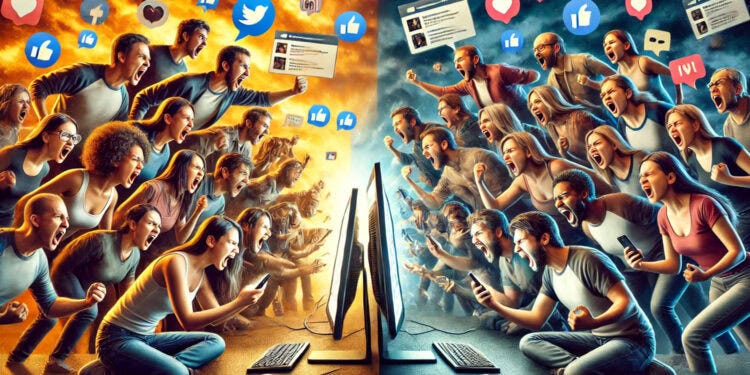The AI Video Apocalypse
As the Outrage Industrial Complex Gets More Powerful It Will Reveal the True Orientation of Every Heart

Church “politics” have distracted me nearly entirely during the last month and a half of the Paschal season, between the death of Pope Francis, the psy-op and propaganda-filled lead-up to the conclave, and the confusing, just as propagandized, first three weeks of Pope Leo XIV.
Other than briefly and incidentally hearing a few bits of news on U.S. and world politics on the radio while earnestly trying to pay attention to the latest on the papal conclave, I haven’t really bothered with studying whatever Trump is doing, the Democrats are trying to hit him on, and what every “good person” ought to hate, fear, love, buy, sell, inject themselves with, and light cars on fire for.
My lack of attention, however, hasn’t really hurt me, at least so far. Perhaps my failure to wear a Trump hat or post J.D. Vance memes nonstop will lead us into the globalist dystopia 5 minutes earlier than we would have if I hadn’t. Perhaps I will regret my failure to have understood the detailed, complex actions (or inactions) of Kash Patel’s FBI in May 2025 when a communist Red Guard of AOC’s future dictatorship interrogates me in 2030. Perhaps. But, alternatively, perhaps nothing will change because of the fact that I failed to pay attention to politics, except for the fact that my life feels a lot more peaceful.
Why do we pay attention to politics?
The only reason we pay attention to online politics is that we believe that it is conjoined with real life, and that our participation in politics matters and makes a difference. But if this is the case, surely we also don’t believe this proposition as we don’t spend every waking moment acting as if it’s true, only the moments we choose to care about politics when we’re bored, distracted by a click-baity thumbnail on a YouTube video, or logging on to a Reddit forum or comments section to have a laugh while “owning the libs.” The fact that we rest from online politics belies the fact that we also believe the opposite is true, and politics is not real-life, but a game with lesser stakes and consequences, something that we can jump in or out of.
Yes, there are things to be worried about with regard to the political future, and
as much as The Last Refuge paints some pretty disturbing, futile views of the “deep state’s” control over the world and events:I’m nowhere near as much of a doomer. I enjoy history, and have spent a lot of time studying the Middle Ages in particular. It seems to me that there are always things to be a doomer about and always things that get better in every generation. Perhaps the balance sum of our different behaviors bears some coherence if we believe that, yes, the future will be bad, but will be better than today in some ways and worse than today in others.
Politics: Fake, But Useful At Controlling You
Our participation in online politics, for most of us at least, isn’t really real life, but something worse—the tool of control by the current ruling elite meant to keep us paranoid and depressed.
Perhaps if we just ignored the daily outrages that constitute our political engagement, we’d be happier and have a chance at a better political future.
We implicitly know this. We know that most of the daily outrages or “current things” have little positive impact on our lives. But they are “real life” because of the impact our participation in the outrages has on us. They do have an impact on us, often toward angst and provoked angry responses when we pay attention to them.
See ’s amazing summary of the last decade of “current things” here:
The politics we pay attention to online are all the fake stuff we shouldn’t be paying attention to. Most of it is fake or exaggerated outrages, used by the deep state on us to sway, terrorize, and control us. When we participate in the online discourse, most of the time, we aren’t actually changing things, merely hardening the opposition against us and participating in the dialectical tools of distraction and control, forging the chains used by the elite to control us.
The real, real-life politics are the things we don’t pay enough attention to: what moral values we pass on to our friends, relatives, and children. Christendom was not just the visible splendor and dignified diplomacy between nations, but also the small level way workers treated each other and shopkeepers ran their businesses.
We can’t impact events as much as we think in our neo-feudal world. We do have an impact, but all too often, our joining the discourse, even to oppose a current online outrage, only gives the outrage more fuel and makes the problem worse. Rene Girard’s theory of mimetic desire, contagion, and scapegoating tells us that conflicts have a tendency to spiral and escalate in proportion to the attention people place on them, more than due to the real facts on the ground. Most of the time, ignoring the outrages and focusing on the “real-life” closer to home allows us to actually have a greater political impact.
And we’ll have to quickly get a lot better at this skill of detaching ourselves from the “fake” politics of online outrage. For the outrage generation machine, the Twitterstorm Industrial Complex is about to get a lot worse.
AI Video Outrages Will Unveil Our True Motives
What happens when the recent shocking advancements in AI video create not just one fake or exaggerated outrage a day but dozens or thousands of completely fake outrages?
AI videos may not be real, but their effects sure will be. Already, with Google’s VEO 3 technology, we’re at a point where most people can’t tell the difference between real and fake videos. What happens when hundreds of fake videos of acts of terror are deployed back and forth between extremists on either side of Israel and Palestine, Russia and Ukraine, and leftists and conservatives?
Most Find Virtual Terrorism Easier To Do Than the Real Thing
The goals of terrorism are often the aim of provoking your enemy to an overreaction that you can react to, as with 9/11’s provoking the United States to wreak genocide and mayhem across the Middle East, which discredited, ground down, and is still currently bankrupting the Global American Empire. But terrorism becomes a lot cheaper and easier if you don’t even have to physically kill people or blow up stuff. It also lowers the guard of conscience for many. You might not be willing to launch pre-emptive terror against that tribe over there, but you’d be willing to fake an act of terror with AI video to discredit or provoke them into taking an action that you can then react to while still claiming the moral high ground that you didn’t start it.
What Happens When It’s All Fake?
Currently, we can choose not to participate in the daily outrages. There are still fewer of them than there are real things, even online. It’s still possible to tell that they’re fake. But as AI outrages get more realistic, and outnumber real manifestations of reality, we’re in a different world where the online culture of fake outrages becomes almost impossible to escape.
This is especially the case if the outrages can be personalized and individualized far more than the scams and outrages of the last decade. Even the largest scams, like COVID, were limited by the sheer force with which they were rhetorically and propagandistically forced upon us. Many a priori saw through them. But what if a new scam is personalized to your tribe? Say, for instance, as Catholics are all talking about the real outrages of Bishop Martin in Charlotte, someone makes an AI video of him doing something more outrageous? Predisposed by reality to distrust him, it’ll be far, far easier to fall for fraudulent narratives that could be used by outside powers like the liberals in the Church to provoke, say, trads to violence that could be used to discredit us.
An Apocalypse, An Unveiling of the Human Heart
AI video over the next few years will be an apocalypse, or unveiling in the true sense of the true orientation of every human heart. Many still retain civility and politeness in our dealings merely because it’s useful. The cost/benefit equation leans against starting an outrage and towards being truthful and polite. Fact-checking, as fake as the industrial version is, keeps our narratives somewhat grounded in a shared consensus reality. The news is fake, but we know it’s not overly problematic to pay attention, because it’s not all fake.
But AI changes the practical and moral equations. Suddenly, the incentive is to be the first to be out there with a story, backed up by video evidence galore, of your enemies doing something heinous or your side doing something glorious.
AI video will be an apocalypse in the true sense of the word, an unveiling, as the temptation to participate in launching fake outrages and to believe in them because they support “your side” will be too strong for most to resist. AI will unveil and reveal the true orientation of our hearts, toward truth, or toward lies that serve our personal ends. This is especially if someone launches a fake AI video about you. The temptation to strike back with fake accusations and fake AI videos of our own rather than not joining in the frenzy, not letting them strike the other cheek, will be impossible for most of us to resist.
The Frenzy
Even as lies and fakery seem to outnumber truth, the truth about our hearts will be revealed and made manifest in the mimetic frenzies and feuds of violence that will soon take over online discourse even more than they already have. For those with such a heart of anger, who focus on the online discourse and take it as real, taking it as what matters, the violence will soon spill over into physical reality, as you won’t even have to be a big name pundit or have committed some real outrage in order to be targeted by many a frenzied, scapegoating mob.
Innocents will be caught up in the cacophony of violence, but the only ones who have a chance of surviving, physically or morally, are those who choose to reject online outrage for physical reality, who choose real-life politics over online politics. Everyone who, in the deepest depths of their heart, has made the opposite choice, however, will have the true orientation of their hearts made manifest.
The Escape Hatch of the “Real World”
In the long run, AI technology will be self-discrediting. Eventually, so much of the online world will be fake that we’ll just distrust it all and return closer to reality, to a localized vision, to trusting only those things and people that we can physically verify. Only those who can actually live in reality will survive in reality.
Yes, the “deep state” bansters will have a blast during the period of apocalypse, but they will be caught up in this period of apocalyptic revelation as much as the people they’ve been successfully puppeting for so long. History, if the true end of time is not to come soon, will continue, with conspiracies and evils as much as heroes and saints.
But in the meantime, things are going to get wild and crazy:








Yes, dude, the grey goo apocalypse is nigh. This is the AI whitepill. Until everyone has a personal, blockchain validated AI angel on their shoulder, everything is fake until proven otherwise. Let’s all stick our fingers in the spear wound or speak no evil .
Video evidence is over.